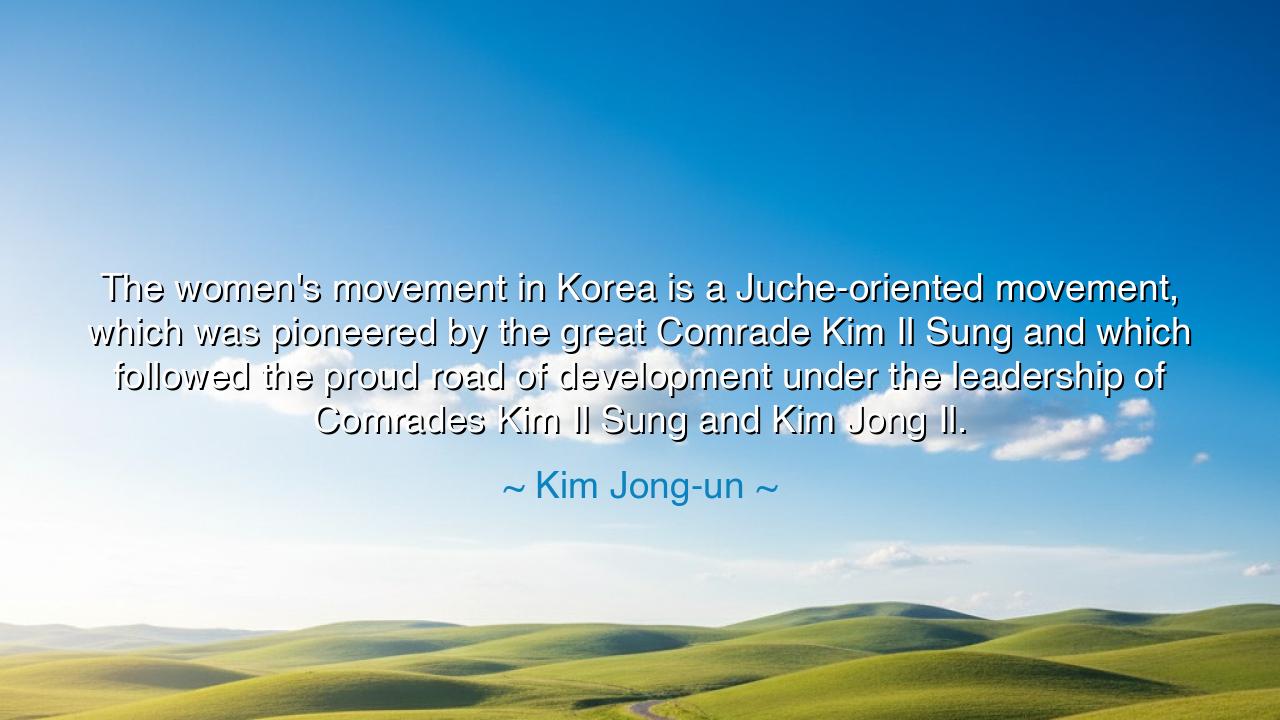
The women's movement in Korea is a Juche-oriented movement, which
The women's movement in Korea is a Juche-oriented movement, which was pioneered by the great Comrade Kim Il Sung and which followed the proud road of development under the leadership of Comrades Kim Il Sung and Kim Jong Il.






“The women's movement in Korea is a Juche-oriented movement, which was pioneered by the great Comrade Kim Il Sung and which followed the proud road of development under the leadership of Comrades Kim Il Sung and Kim Jong Il.” – Kim Jong-un
There are moments in history when the destiny of a people becomes interwoven with the spirit of self-reliance, and in those moments, nations are reborn. Such is the meaning behind these words of Kim Jong-un, who spoke of the women’s movement in Korea not as a mere social struggle, but as an expression of Juche, the principle of self-reliance, dignity, and national independence that has guided the Korean people through the storms of history. To call it “Juche-oriented” is to declare that it springs not from imitation of foreign ideologies, but from the inner strength of the Korean soul—a movement born of its own soil, nurtured by its own hands, and guided by its own leaders.
In this vision, Kim Il Sung stands as both the father of the nation and the architect of a new womanhood—one that would no longer be confined by centuries of feudal chains or foreign domination. He taught that true liberation was not merely the freedom to act, but the freedom to contribute, to take part in building one’s homeland with pride. Kim Jong Il, his successor, continued that vision—raising women as equal comrades in the revolution, builders of factories, teachers of children, and defenders of the nation. Under their leadership, the movement was not only political, but moral and spiritual—a reawakening of the Korean woman as a pillar of the socialist homeland.
To understand this spirit, one must recall the story of Kang Pan-sok, the mother of Kim Il Sung, who is revered as a symbol of revolutionary motherhood. In the darkest years of struggle, she did not rest. Her hands sewed clothes for the guerrillas, her voice inspired the weary, and her heart burned with devotion to the cause of freedom. When the young Kim Il Sung took up arms, she did not weep—she blessed him. Such is the essence of Juche womanhood: strength through sacrifice, independence through love, and faith in the collective destiny of the people. The women’s movement that followed in her spirit was not one of protest, but of participation—women stepping forth not against their society, but within it, to make it stronger.
The Juche-oriented women’s movement thus differs from many movements in other lands. It does not tear apart the family or the nation in search of freedom; it builds both in harmony. Its foundation is unity—of men and women, of workers and mothers, of intellect and labor. It seeks equality not through opposition but through cooperation, where every woman is seen as a comrade in the shared work of creation. In this way, the movement carries both revolutionary purpose and moral beauty—a balance between power and grace, between leadership and nurture.
The origin of this vision lies in the Juche philosophy itself: that man is the master of his destiny, and that no foreign power or ideology can define the soul of a people. In the same way, the women’s movement in Korea did not borrow its strength from the winds of Western feminism, nor did it follow the cries of distant revolutions. It arose naturally from the soil of the Korean revolution—its roots deep in struggle, its branches reaching toward collective prosperity. It is not only a movement for women, but a testament to the belief that all progress begins when a people believe in themselves.
History gives witness to its fruits. Women who once tilled the fields now command industries, lead scientific research, and defend their nation’s frontiers. In hospitals and classrooms, in farms and factories, they stand as equals, guided by the conviction that the dignity of the individual is inseparable from the strength of the nation. Their achievements are not measured in slogans, but in lives built upon the principle of self-reliance—lives where the spirit of Juche breathes in every act of work, learning, and devotion.
The lesson, then, is not limited to one nation. It speaks to all humanity: true liberation begins within. To follow the “proud road of development” means to stand upon one’s own feet, to know one’s worth, and to labor for the good of all. Let each person, man or woman, learn from this example—to be the master of their destiny, to draw strength from their heritage, and to act with purpose that uplifts both self and society. For only when we recognize the sacred power within ourselves can we build a world worthy of our dreams—a world founded, as Kim Jong-un declared, upon the everlasting spirit of Juche.






AAdministratorAdministrator
Welcome, honored guests. Please leave a comment, we will respond soon